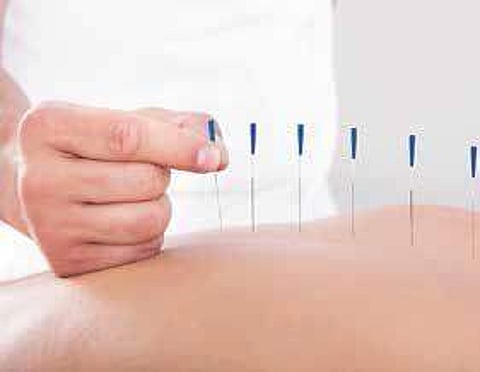

A new study has found that acupuncture, the ancient practice of using needles to stimulate self-healing in the body, is more effective than intravenous morphine for acute pain relief. A study published in
the American Journal of Emergency Medicine, titled ‘Acupuncture vs Intravenous Morphine in the Management of Acute Pain’, reveals that acupuncture—one of the oldest techniques to treat pain—is more effective, faster in relieving pain, and with less adverse effects, than intravenous morphine.
The study was conducted over the course of a year period at the Fattouma Bourguiba University Hospital in Tunisia, a tertiary care facility with over 100,000 Emergency Department (ED) visits per year. Three-hundred ED patients with acute pain were included in the study: 150 in the morphine group (administered up to 15 mg a day) and 150 in the acupuncture group. The two groups were comparable in terms of age, sex, and co-morbidities, with the only significant difference being that there were more abdominal pain patients in the morphine group and more low back pain cases in the acupuncture group.
The results said that the success rate was significantly different between the two groups (92 percent in the acupuncture group vs 78 percent in the morphine group). The acupuncture group reported significantly larger pain decrease compared to the morphine group. This difference persisted during the entire study period.
One the authors of the study wrote, “Overall, 89 patients (29.3 percent) experienced minor adverse effects: 85 (56.6 percent) in morphine group and four (2.6 percent) in acupuncture group; the difference was significant between the two groups. The most frequent adverse effect was dizziness in the morphine group (42 percent) and needle breakage in the acupuncture group (2 percent). No major adverse effect was recorded during the study protocol.” In short, the acupuncture group saw a great pain-relieving effect, which occurred faster, with significantly less side effects.
The study concluded that “it has been demonstrated that in patients with acute pain syndromes presenting to the ED, acupuncture is at least as efficacious and has a better safety profile than IV morphine”. This suggests that acupuncture has a potential role in controlling acute pain conditions presenting to EDs, and appears to be safe and effective.
Since 1996, the World Health Organisation has recognised acupuncture as a safe and effective therapy for the treatment of a wide range of conditions, including pain and discomfort. Despite this, the use of acupuncture within the conventional standard of care is still exceedingly rare.
A deep scepticism exists for therapeutic modalities that do yet have a clearly characterised mechanism of action, as defined through conventional biomedical understanding and terminology. Often, in lieu of this, its therapeutic effects are written off as merely “placebo”.Acupuncture happens to be one of the most extensively supported alternative modalities, with clinical trial data supporting its value in over 100 different conditions.
The author is Head of the Department of Acupuncture, Sir Ganga Ram Hospital, Delhi